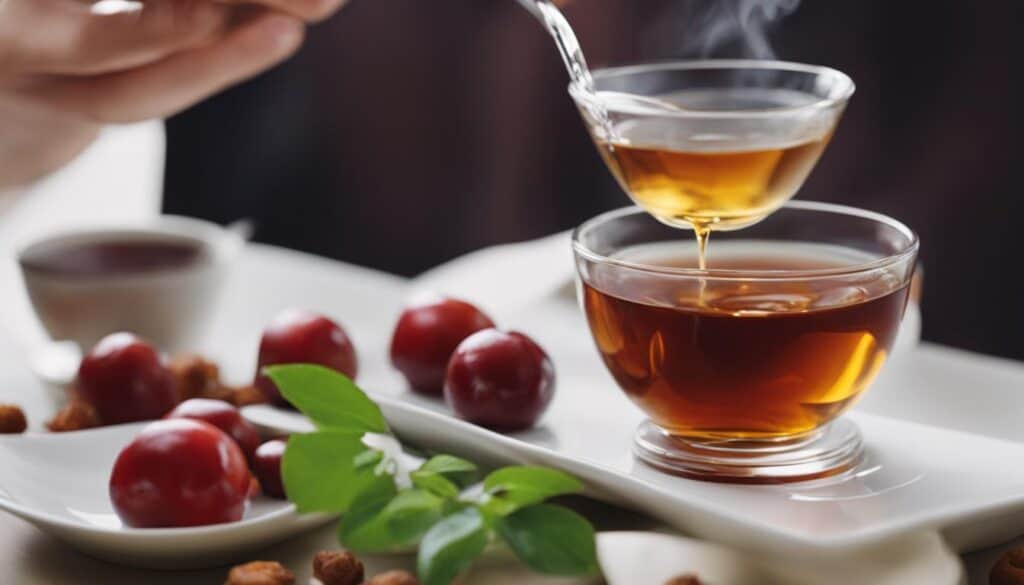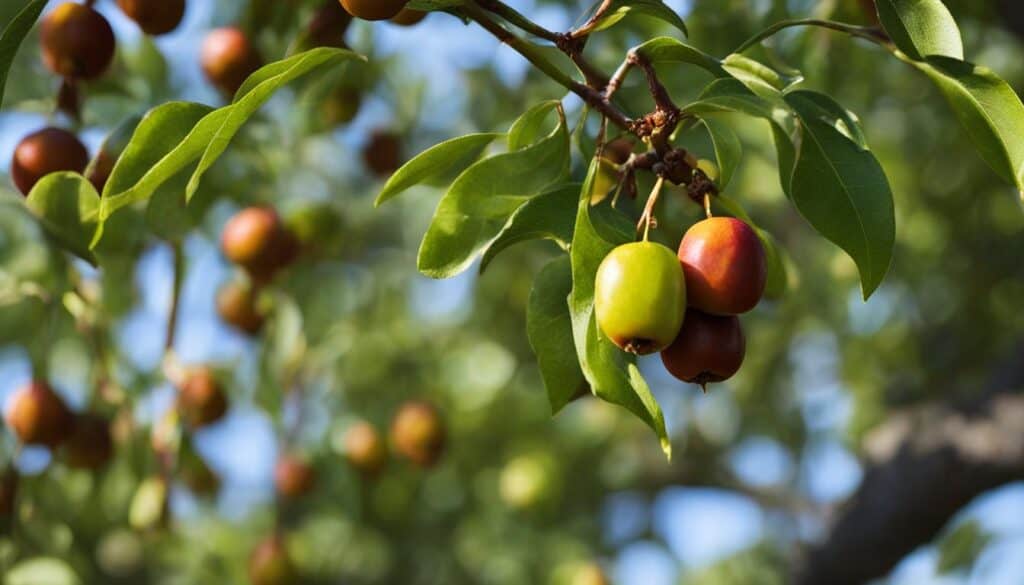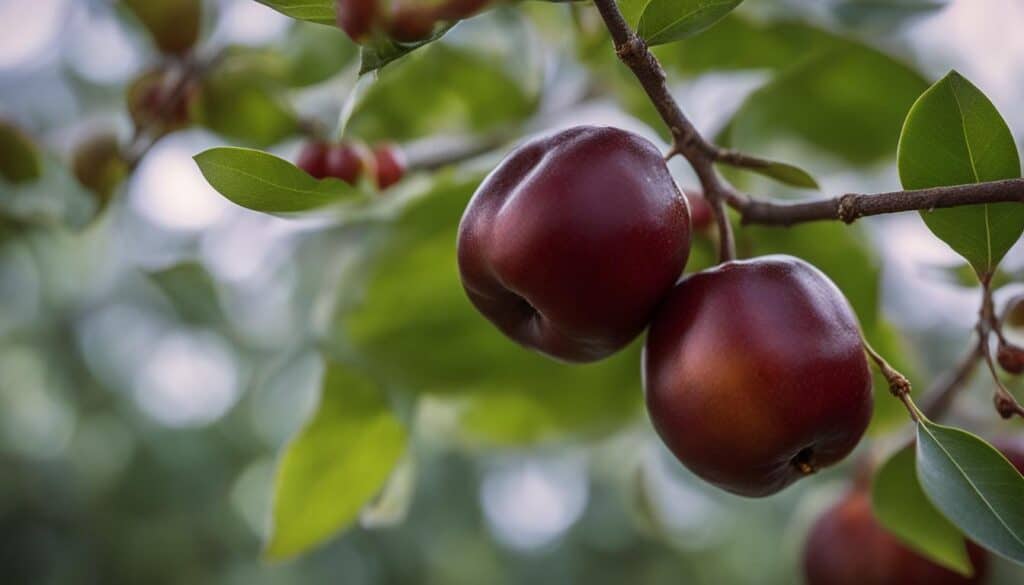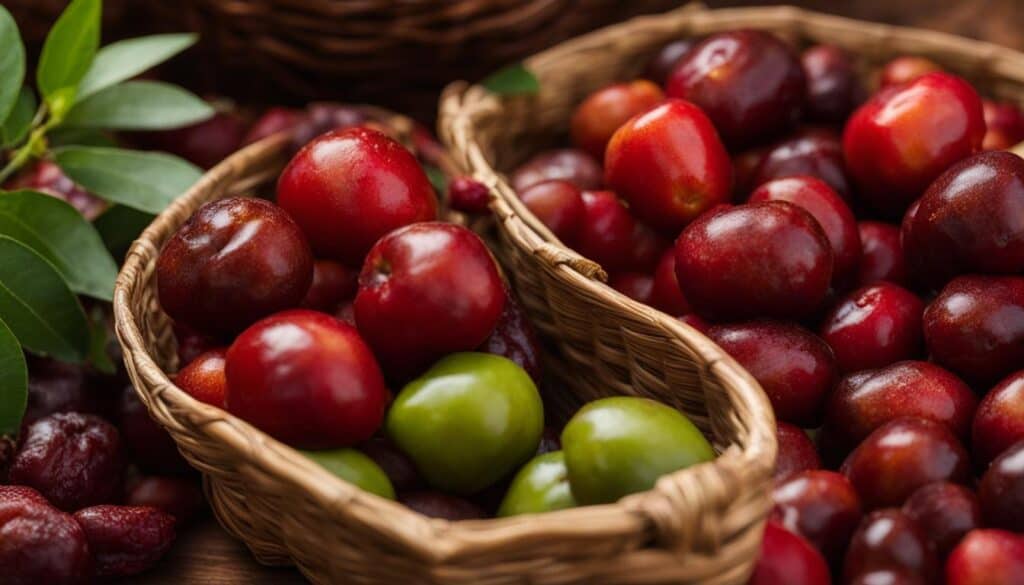Hi, I’m excited to introduce you to the incredible world of jujube tea! This traditional herbal tea made from the dried fruit of the Ziziphus jujuba bush has been a remedy for over 4,000 years. Join me on this journey as we explore the impressive health benefits of jujube tea and learn how to make it at home.
Key Takeaways:
- Jujube tea is a traditional herbal tea made from the dried fruit of the Ziziphus jujuba bush.
- It is packed with nutrients like vitamin C, antioxidants, potassium, iron, and B vitamins.
- Jujube tea has potential antioxidant properties and offers various health benefits, including relieving constipation, strengthening the immune system, improving bone health, and reducing anxiety.
- You can easily make jujube tea at home using a simple recipe.
- Enjoy the delicious taste and reap the benefits of jujube tea as part of a healthy lifestyle.
What is Jujube Tea?
Jujube tea, also known as daechu-cha, is a tisane made from the dried fruit of the Ziziphus jujuba bush, commonly referred to as the Chinese date or red date. This fruit has been treasured in traditional medicine for its numerous health benefits for centuries. With its rich nutrient composition, including antioxidants, vitamin C, polyphenols, potassium, iron, and B vitamins, jujube tea has gained popularity worldwide.
The Ziziphus jujuba bush, native to China, produces small, sweet fruits that are harvested and dried to create the tea. The resulting beverage has a unique flavor profile, combining sweetness and a hint of tartness. Jujube tea is often enjoyed hot and is prized for its ability to improve overall well-being.
Jujube tea is a refreshing and revitalizing drink that can be easily incorporated into your daily routine. Whether sipped on its own or combined with other ingredients, this tea offers a delicious way to experience the benefits of the Ziziphus jujuba bush. So, why not indulge in a comforting cup of jujube tea and embrace the rich goodness it has to offer?
Benefits of Jujube Tea

Jujube tea offers a multitude of health benefits that can improve overall well-being. It has potential antioxidant properties, which can help reduce inflammation and oxidative stress. The tea is known to relieve constipation and gastrointestinal problems, promoting healthy digestion. Additionally, jujube tea can strengthen the immune system, alleviate symptoms of the common cold and flu, and promote better sleep. It also supports bone health, cardiovascular function, and enhances skin appearance. By incorporating jujube tea into your daily routine, you can experience these impressive health benefits.
Relieve Constipation and Aid Digestion
One of the notable benefits of jujube tea is its ability to relieve constipation and support healthy digestion. The tea has natural laxative properties that can help soften stool and promote regular bowel movements. It also aids in reducing bloating and easing gastrointestinal discomfort. By incorporating jujube tea into your diet, you can improve your digestive health and maintain regularity.
Boost the Immune System
Jujube tea is packed with essential vitamins and antioxidants that can help strengthen the immune system. The tea’s high vitamin C content enhances the body’s natural defense mechanisms, protecting against harmful pathogens and reducing the risk of illness. By regularly consuming jujube tea, you can give your immune system the extra support it needs to stay strong and fight off infections.
Promote Better Sleep and Relaxation
Jujube tea is known for its calming properties, making it an excellent beverage to promote better sleep and relaxation. The tea contains compounds that help regulate the sleep-wake cycle, allowing for a more restful and rejuvenating sleep. By enjoying a cup of warm jujube tea before bedtime, you can unwind, reduce anxiety, and encourage a peaceful night’s sleep.
Improve Bone Health and Increase Circulation
Jujube tea is rich in essential minerals like calcium and phosphorus, which are vital for maintaining healthy bones and preventing bone-related diseases such as osteoporosis. The tea also contains compounds that can increase blood circulation and improve cardiovascular health. By including jujube tea in your daily routine, you can support strong bones and ensure optimal blood flow throughout your body.
With its numerous health benefits, jujube tea is a delightful and nutritious beverage that can enhance your overall well-being. Incorporate this herbal tea into your daily routine to enjoy its healing properties and experience a healthier and more vibrant life.
How to Make Jujube Tea
Making jujube tea at home is a simple and rewarding process. Here is a step-by-step guide on how to make delicious jujube tea:
- Start by gathering the necessary ingredients: filtered water, cinnamon sticks, dried jujubes, ginger, and brown sugar.
- Fill a pressure cooker with filtered water and add the cinnamon sticks, dried jujubes, ginger, and brown sugar according to your desired taste.
- Close the pressure cooker lid and set it to high pressure. Let the ingredients boil for approximately 20 minutes.
- After 20 minutes, release the pressure from the cooker and carefully open the lid.
- Strain the tea into a teapot or individual cups to remove any solid particles.
- Your homemade jujube tea is now ready to be enjoyed hot. Optionally, you can add pine nuts to enhance the taste and aroma.
With this simple recipe, you can create a flavorful and aromatic jujube tea that not only tastes great but also provides numerous health benefits.
Jujube Tea Side Effects

While jujube tea offers numerous health benefits, it is important to be aware of potential side effects. It is generally safe for consumption, but it is crucial to consume it in moderation. Pregnant women are advised to avoid jujube tea due to conflicting research on its safety during pregnancy.
In addition, jujube tea may interact with certain medications. It is essential for individuals with pre-existing conditions or those taking medications to consult a healthcare professional before adding jujube tea to their routine. This will help ensure that there are no potential complications or drug interactions that could arise.
Diabetics should also exercise caution when consuming jujube tea, as it may lower blood sugar levels. Monitoring blood sugar levels regularly is recommended to avoid any potential complications.
Jujube Tea Side Effects At a Glance:
- Pregnant women should avoid jujube tea due to conflicting research on safety
- Jujube tea may interact with certain medications
- Consult a healthcare professional before consuming jujube tea if you have pre-existing conditions or are taking medications
- Diabetics should monitor blood sugar levels when consuming jujube tea
| Side Effects | Precautions |
|---|---|
| Conflicting research on safety during pregnancy | Avoid jujube tea when pregnant |
| Potential interactions with certain medications | Consult a healthcare professional before consuming jujube tea if you have pre-existing conditions or take medications |
| Possible blood sugar lowering effects | Monitor blood sugar levels if you have diabetes |
Jujube Fruit Overview

Jujube fruit, also known as the Chinese date, is a small fruit native to China. It has been consumed for over 3,000 years and is known for its delicious taste and impressive health benefits. The fruit is small and round, with a thin, edible skin and whitish flesh. When ripe, the fruit turns dark red and softens, providing a sweet and slightly tart flavor.
One of the key reasons why jujube fruit is highly regarded is its nutritional value. It is packed with essential vitamins and minerals, making it a nutritious addition to any diet. Jujube fruit is particularly rich in vitamin C, which is essential for a strong immune system and healthy skin. It also contains potassium, an electrolyte that helps regulate blood pressure and maintains proper heart function.
Another benefit of jujube fruit is its low calorie content. This makes it an excellent choice for those who are watching their weight or trying to maintain a healthy lifestyle. Despite being low in calories, jujube fruit is a good source of dietary fiber, which aids in digestion and promotes feelings of fullness.
Overall, jujube fruit is a versatile and nutritious fruit that offers a range of health benefits. Whether enjoyed fresh, dried, roasted, candied, juiced, or made into jams, this fruit is a delightful addition to any diet. With its delicious taste and impressive nutritional profile, jujube fruit is definitely worth incorporating into your daily routine.
Jujube Fruit Benefits

When it comes to jujube fruit, the benefits go beyond just its delicious taste. This small fruit is packed with antioxidants, which can help protect your cells from damage caused by harmful free radicals. These antioxidants, such as flavonoids and triterpenic acids, can also contribute to better sleep quality, making jujube fruit a natural sleep aid.
In addition to its antioxidant properties, jujube fruit is also rich in fiber, making it an excellent choice for promoting healthy digestion and relieving constipation. The high fiber content helps to regulate bowel movements and promote the growth of beneficial gut bacteria, which can further enhance digestive health.
Furthermore, consuming jujube fruit can provide a boost to your immune system. With its high levels of vitamin C, this fruit can help strengthen your body’s defenses against common illnesses and infections. Including jujube fruit in your diet can help support your overall immunity.
With its antioxidant properties, digestive benefits, and immune-boosting abilities, jujube fruit is a nutritious and tasty addition to a healthy lifestyle.
Precautions and Interactions
When incorporating jujube fruit into your diet, it is important to take certain precautions to ensure its safe consumption. While jujube fruit is generally safe, excessive intake may have laxative effects, so it is recommended to enjoy it in moderation. Additionally, individuals taking antidepressant drugs, such as venlafaxine, should avoid consuming jujube fruit due to potential interactions.
Avoiding excessive consumption of jujube fruit is important as it may cause gastrointestinal discomfort and diarrhea. It is always best to consult with a healthcare professional or a registered dietitian before making any significant changes to your diet or incorporating new foods.
Table: Precautions and Potential Drug Interactions
| Jujube Fruit Precautions | Drug Interactions |
|---|---|
| Consume in moderation to avoid laxative effects | Avoid if taking antidepressant drugs (e.g., venlafaxine) |
| Consult with a healthcare professional before significant dietary changes | – |
| Avoid if experiencing gastrointestinal discomfort or diarrhea | – |
If you have any concerns, medical conditions, or are taking medications, it is always best to consult with your healthcare provider before incorporating jujube fruit into your routine. They can provide personalized guidance based on your specific health needs and help ensure your safety and well-being.
How to Enjoy Jujube Fruit

I am delighted to share with you some creative and delicious ways to enjoy jujube fruit. Whether you prefer it fresh, dried, roasted, candied, juiced, or in jams, there is a jujube fruit preparation that will suit your taste and culinary preferences.
Fresh: When jujube fruit is ripe, it has a sweet taste and a texture similar to that of an apple. Simply wash the fruit, remove the pit, and enjoy it as a refreshing snack or add it to fruit salads for a burst of natural sweetness.
Dried: Dried jujube fruits, commonly known as “red dates,” are perfect for cooking and baking. They can be added to soups, stews, and desserts, bringing a unique and slightly sweet flavor to your dishes. Dried jujube fruits can also be enjoyed as a healthy and nutritious snack on their own.
Roasted, Candied, Juiced, and Jams: Jujube fruit can be further transformed into delightful treats. Roasting jujube fruits brings out their natural sweetness and intensifies their flavor. Candied jujube fruits make for a delightful snack or a charming addition to desserts. Juicing jujube fruits allows you to enjoy their health benefits in a refreshing drink. Lastly, making jams and preserves with jujube fruits preserves their flavors for long-term enjoyment.
Experiment with these various preparations and discover the versatility of jujube fruit in your own kitchen. Let your taste buds guide you as you explore the delightful flavors and textures that jujube fruit has to offer.
Table: Comparing Different Ways to Enjoy Jujube Fruit
| Preparation Method | Description |
|---|---|
| Fresh | Ripe jujube fruit eaten as a snack or added to fruit salads |
| Dried | Jujube fruit dried and used in cooking, soups, stews, and desserts |
| Roasted | Jujube fruit roasted to intensify its flavor and sweetness |
| Candied | Jujube fruit cooked in a sugar syrup to create a sweet, chewy treat |
| Juiced | Jujube fruit juiced for a refreshing and nutrient-packed beverage |
| Jams and Preserves | Jujube fruit cooked down with sugar to create flavorful spreads |
Conclusion
In conclusion, both jujube tea and jujube fruit offer a plethora of health benefits that can contribute to your overall well-being. Jujube tea, made from the dried fruit of the Ziziphus jujuba bush, is packed with essential nutrients like vitamin C, antioxidants, and B vitamins. It has potential antioxidant properties, aids digestion, strengthens the immune system, improves bone health, promotes better sleep, and benefits cardiovascular health. Making jujube tea at home is a simple and enjoyable process, allowing you to reap the rewards of this delicious beverage.
Jujube fruit, also known as the Chinese date, is a nutritious and low-calorie snack option. It is rich in vitamins, minerals, and antioxidants, enhancing your overall health. The fruit’s antioxidants protect against cell damage, while its high fiber content aids digestion and relieves constipation. Furthermore, jujube fruit’s high vitamin C content boosts the immune system, improving your body’s defense against illnesses. Whether enjoyed fresh, dried, roasted, or juiced, jujube fruit allows for culinary creativity and a delightful taste experience.
Embracing jujube tea and jujube fruit as part of a healthy lifestyle can provide a wide range of benefits for your body and mind. From relieving constipation and boosting immunity to promoting better sleep and aiding digestion, these natural remedies have been trusted for thousands of years. So why not indulge in a delicious cup of jujube tea or snack on some jujube fruit today? Your taste buds and your health will thank you!
FAQ
What is jujube tea?
Jujube tea is a herbal tea made from the dried fruit of the Ziziphus jujuba bush, also known as the Chinese date or red date.
What are the benefits of jujube tea?
Jujube tea has potential antioxidant properties, can relieve constipation, strengthen the immune system, improve bone health, reduce anxiety, aid digestion, promote better sleep, and promote cardiovascular health.
How do I make jujube tea?
To make jujube tea, you will need filtered water, cinnamon sticks, dried jujubes, ginger, and brown sugar. Boil the ingredients in a pressure cooker for a specific amount of time to achieve a flavorful and aromatic tea.
Are there any side effects of jujube tea?
Pregnant women are advised to avoid jujube tea due to conflicting research on its safety. Diabetics should be cautious as it may lower blood sugar levels. Individuals with pre-existing conditions or taking medications should consult a doctor before adding jujube tea to their routine to ensure there are no potential complications or drug interactions.
What is jujube fruit?
Jujube fruit, also known as the Chinese date, is a small fruit with a thin, edible skin and whitish flesh. It is high in vitamins and minerals, particularly vitamin C and potassium.
What are the benefits of jujube fruit?
Jujube fruit is rich in antioxidants, aids digestion, relieves constipation, improves sleep quality, and boosts the immune system due to its high vitamin C content.
Are there any precautions or interactions with jujube fruit?
It is advised to eat jujube fruit in moderation, as excessive intake may have laxative effects. Individuals who take antidepressant drugs, such as venlafaxine, should avoid consuming jujube fruit due to potential interactions. It is important to consult a healthcare professional if you have any concerns or are taking medications.
How can I enjoy jujube fruit?
Jujube fruit can be enjoyed fresh, dried, roasted, candied, juiced, or made into jams and spreads. It is a versatile fruit that can be incorporated into various culinary creations.
What are the health benefits of jujube tea and fruit?
Embracing jujube tea and fruit as part of a healthy lifestyle can contribute to overall well-being by relieving constipation, aiding digestion, boosting the immune system, improving sleep quality, and promoting better cardiovascular health.





Leave a Reply